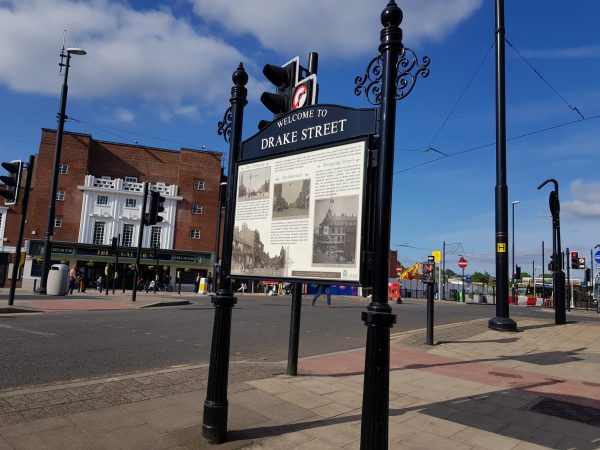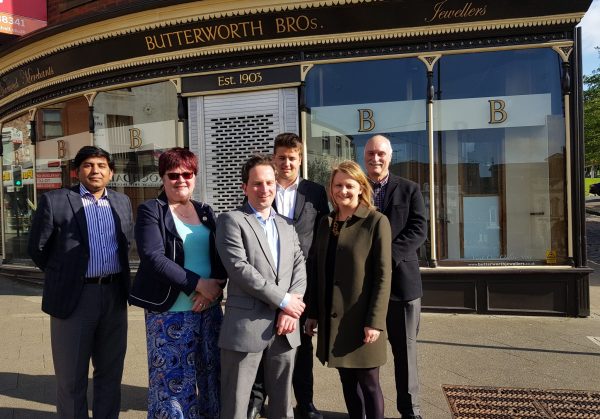The spirit of the Rochdale Pioneers is returning to help the town once again, with ambitious plans drawn up to use the area’s iconic co-operative heritage to drive growth and regeneration.
Rochdale is hailed as the birthplace of the modern-day co-operative movement – but is also the tenth most-deprived area in the country. To help address its problems, a five-year project is being run to create homes, renovate buildings and encourage enterprise.
It is part of a series of schemes in the national Heritage Action Zone programme run by Historic England, a public body sponsored by the Department for Culture, Media and Sport (DCMS), in partnership with local councils and other organisations.
Historic England has teamed up with Rochdale Council for the project, along with Link4Life, housing co-op Rochdale Boroughwide Housing (RBH), Rochdale Town Centre Management Company and the Co-operative Heritage Trust.

Through the Co-operative Connections Heritage Action Zone (HAZ), the council wants to highlight local buildings with co-operative connections, and use their historic significance as a springboard for development. It plans to create 200 new homes and – supported by a grant scheme – renovate of a number of historic sites, bringing them off Historic England’s At Risk Register.
Last month, RBH pledged £25m of its own resources over the next five years to deliver regeneration plans.
Plans also include heritage trail through the historic buildings in the area, many of which are linked to the co-op movement, which will link the railway station with the town centre.
Related: Can blockchain unlock the hidden value in Hull’s economy?
And the HAZ will support a co-operative enterprise hub, developing new co-operative businesses, funded through the Co-operative Group’s “Together Enterprise” programme.
The hub will be run by the Co-operative College, in partnership with the council, and hosted at the former Butterworth jewellers building at 14 Drake Street.

The pilot will teach young people from the area about co-operatives, co-operative ways of working and enterprise in interactive sessions, with a focus on team working, self-confidence and group decision making.
Regeneration plans will see approximately 10 shop fronts improved within the HAZ area by 2023 and a further eight heritage assets repaired or restored and, if vacant, brought back in to use.
Furthermore, the project will carry out a ‘Historic Area Assessment’ to understand the significance of the buildings within the HAZ area and engage with 11 schools through ‘Heritage Schools’ project.
Related: Co-op model as a vehicle for change in local government
The project was launched Rochdale Town Hall on 16 May. Councillor Janet Emsley, cabinet member for leisure and culture at the council, said: “We are lucky enough to have some spectacular heritage buildings here in Rochdale, so no plan to regenerate our town centre would be complete without major investment in these important assets.
“I’m really proud to say that since we achieved Heritage Action Zone status, we’ve already had a major boost, with grant one funding approval from the Heritage Lottery Fund for the redevelopment of the town hall, so we’re already well on our way to bringing our fabulous heritage to life as part of a regenerated and transformed town centre.”
Catherine Dewar, planning director for Historic England North West, said: “We’re delighted to be working with Rochdale. It has such fantastic historic buildings and spaces and we want to work together to make the most of its heritage. We have a great opportunity to work with other organisations and the community in partnership, continuing the fascinating history of co-operation in the town.”
Liz McIvor, from the Co-operative College, added: “Co-operatives are popular around the world, but we need to ensure that their influence remains strong here in Rochdale, because this is where it all started.
“By celebrating this international movement and its Rochdale roots, we will help restore a sense of place, a sense of something great having gone before and something great still to come.”
Paul Cocker of the Co-operative College added: “As we look back to the co-operative history we have to opportunity to look forward towards a co-op future, use co-op values and principles to make a co-op town.”
John Searle, director of economy at Rochdale Council, said the Greater Manchester mayor Andy Burnham also had a role to play in supporting residential growth in Rochdale. He said: “Rochdale is not a failing town centre, but has to move on to the next level.”
Speaking at the Co-operative Education Conference last month, Mr Burnham called for efforts to regenerate the region’s outlying towns.
Around £250m being invested in the core town centre area since 2011 as part of the council’s regeneration efforts.
Rochdale Borough Council committed to £1,600,000 to the Heritage Action Zone, which will complement a £611,000 investment and expertise offered by Historic England. The Council and its partners plan to invest a total of £25m in heritage in Rochdale town centre over the next five years. The investment is expected to attract private sector investment in excess of £15,000,000.